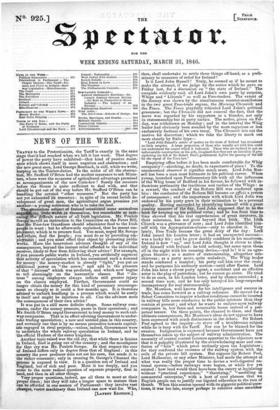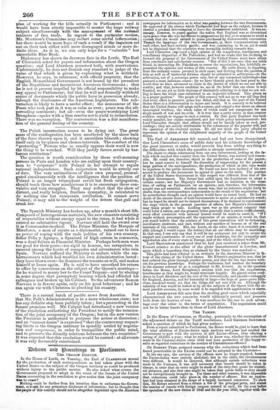NEWS OF THE WEEK.
THANKS to the Protectionists, the Tariff is exactly in the same cr that it had reached when we left it last week. That degree of power the party have exhibited—that kind of passive resist- ance which shows itself in mere negation and obstruction ; and the new great man, Lord George Bentmck, is still, while we write, harping on the Timber-duties. In the midst of all the obstruc- tion, Mr. Stafford O'Brien had the modest assurance to ask Minis- ters, where were the measures of agricultural advantag.e promised as accompaniments of the new Corn-law Surely the measure
• before the House is quite sufficient to deal with, and that should be got out of the way before Mr. Stafford O'Brien can be handling the coveted "other measures." But the party has not yet exhausted its resources : in spite of its recent lavish de- velopment of great men, the agricultural organ promises yet another—a young nobleman who is to take the lead. The(anomalous subject of Ireland occasioned some anomalous
suge*ob us, little worth in themselves, but remarkable as indi- cating the difficult nature of all Irish legislation. Mr. Poulett Scrope moveil an instruction to the Committee on the Fever Bill, that the Poor-law Guardians should administer food to the Irish people in want : but he afterwards explained, that he meant em- ployment, which is to procure food. You must, urged Mr. Scrope and others, feed the people ; you must do so by providing em- ployment; and you must effect that object by promoting public works. Have the benevolent advisers thought of any of the consequences, beyond the instant relief afforded to the individual receiver, likely to flow from following their advice? For example, if you promote public works in Ireland, you artificially augment that activity of speculation which has occasioned such a demand for money : the money-market is already "tight," you put an additional power on "the screw," and add to the pressure of that "distress" which was predicted, and which now begins to tell alarmingly on the mercantile classes. But " dis- tress " among employers always inflicts still greater injury on the classes employed. Further, Government could no longer obtain the money for this kind of pecuniary encourage- ment so cheaply as it could a few months ago. It is therefore advised to embark headlong in a process which would be costly to itself and might be injurious to all. Can the advisers mete the consequences of their own advice? It was put in a still more definite shape. Some railway com- panies, under the money pressure, pause in their operations ; and Mr. Smith O'Brien urged Government to lend money to such rail- way companies. That is in effect advising Government to under- take trading speculation ; a new and untried plan in this country, and certainly one that is by no means protective towards capital- ists engaged in rival projects,—unless, indeed, Government were to undertake the whole railway speculation in Ireland, and be the official Hudson of the sister kingdom. Another topic raised was the old cry, that while there is famine In Ireland, food is going out of the country ; and the mouthpiece for that cry was Mr. Poulett Scrope. In that respect the case of Ireland differs only in degree from that of England : in this
country the poor producer does not eat his corn, but sends it to the richer consumer; only in crossing St. George's Channel the process is exposed to view. It is a question not of Ireland and England, but of rich and poor. Moot it too deeply, and you come to the more radical question of separate property, first in land, and then in all other things. 'Very proper questions, indeed, are all these to moot at their proper times ; but they will take a longer space to mature than can be afforded in one session of Parliament : they involve vast changes, vaster machinery than Ireland can now wait for. Who, then, shall undertake to settle these things off-hand, as a preli- minary to measures of relief for Ireland ?
Is it Lord John Russell ? Truly, he seemed as if he meant to make the attempt, if we judge by the notice which he gave on Friday last, for a discussion on the state of Ireland." The escapade evidently took all Lord John's own party by surprise, Whigs and " Liberals " as well as Free-traders. The extent of the dismay was shown by the simultaneous counter-manifestoes in the two great Free-trade organs, the Morning Chronicle and the Times. The Times playfully ridiculed Lord John's political greenness ; but the Chronicle did not conceal the fact, that the move was regarded by his supporters as a blunder, not only in statesmanship but in party tactics. The notice, given on Fri- day, was withdrawn on Monday ; and in the interval the Whig leader had obviously been assailed by the more sagacious or less exclusively factious of his own troop. The Chronicle lets out the motive for discretion ; which we take the liberty to mark out more clearly by Italic type— "Lord John Russell's notice of motion on the state of Ireland has occasioned no little surprise. A large proportion of those who usually act with him could not understand the course which it indicated. Those who are inclined to put an unfavourable construction on his acts, imagined that they saw an intention ofpre- cipitating the fall of Sir Robert Peel's government before the passing of the bill for the repeal of the Corn-law."
Emptying office before it has been made comfortable for Whig occupancy I—shocking, no doubt, to expectants of place To the unconcerned observer it signifies much more. Lord John Rus- sell has been a man most fortunate in his political career. When young, launched upon Parliamentary life with all the influences of the Whig house of Bedford in his favour, he followed with in- dustrious pertinacity the traditions and tactics of the Whigs : as a reward, the conduct of the Reform Bill was conferred upon him : the conductor of the Reform Bill became ex exit) a person of consequence ; and the importance with which Lord John was endowed by his party grew in their estimation to be a personal quality. Having succeeded by identifying himself with a greet passing measure of the-aiy, Lord John supposed that to be,the trick for keeping up his political value ; and he has from time to time showed that his real apprehension of great measures, in their substance, has not gone beyond that trick. The IAA. Church was a grievance of note ; and Lord John identified him- 'self with the Appropriation-clause--only to abandon it. Very lately, Free Trade became the great deity of the day : Lord issued ssued his London letter , i• it had an unexpected success— was a lucky hit ; and he grew doubly confident n his smartness. Ireland is now "up," and Lord John thought it clever to iden- tify himself with Ireland: he told nobody, but came upon them all in the night with his cunning device,—and lo ! it is an egre- gious blunder ; as a matter of statesmanship, altogether mis- chievous; as a party move, quite maladroit. The Whig leader stands confessed a marplot ; his party call him over the coals; and he postpones his untimely motion—until after Easter. Lord John has been a clever party agent, a confident and an effective actor in the play of patriotism ; but he cannot go alone. He tried to do so once, in his London letter, and by chance succeeded ; a second time now, and he has only betrayed his long-suspected incompetency for real statesmanship. Mr. Morrison, well known for his intelligence and success in trade, has come forward as a railway reformer. He moved for a Select Committee to inquire whether conditions cannot be inserted in railway bills more conducive to the public interests than they contain at present ; and what he wants to enforce upon railway companies is, low fares and terminable leases instead of a per- petual tenure. On these points, the channel to them, and their ultimate consequences, Mr. Morrison's ideas do not appear to have been expressed with much distinctness in the debate. Sir Robert Peel agreed to the inquiry—to stave off a troublesome subject while he is busy with his Tariff. Nor can he be blamed for the
evasion. Indignation is expressed because Government have not themselves taken up the subject of railway administration. The necessity of central control becomes apparent to the objectors now that it is palpably illustrated by the overwhelming mass and con- fusion of " bills ' which press untimely upon the Legislature ; for they confound the excesses of the railway system with the evils of the private bill system. But suppose Sir Robert Peel, Lord Melbourne, or any other Minister, had made the attempt at what was really the proper time to devise a well-digested na-
tional system—before railways were begun, or while few yet existed : how loud would then have been the outcry at legislating without "practical experience," "theorizing," ' med i dling n commercial enterprise," with a host of cant phrases that we English people use to justify our bigoted adherence to the rule of thumb. When this session opened with its gigantic political ques- tions, it was too late, except perhaps to contrive some smoother plan of working for the bills actually in Parliament : and it would have been utterly impossible to master the huge railway subject simultaneously with the management of the national interests of free trade. In regard to the particular motion, Mr. Morrison's Committee may collect some useful information ; but there would be more hope of such a result if the inquirers set out on their task either with more disengaged minds or more de- finite ideas. As it is, we can only hope for a "valuable ". but unreadable Blue Book.
Diplomacy has shown its decorous face in the Lords. The Earl of Clarendon asked for papers and information about the Oregon question ; and Lord Aberdeen promised both, with reservations. Unfortunately, he does not furnish any standard to judge of the value of that which is given by explaining what is withheld. However, he says, in substance, with official propriety, that the English Monarchical Government is not bound by the precedent of the Republican and incontinent American Government ; that he is not at present impelled by his official responsibility to make any appeal to Parliament; but that he will not formally withhold copies of documents which the public have in possession already, through the disclosures of the American Legislature. The con- versation is likely to have a useful effect; the demeanour of the Peers who took part in it was as calm as ever; peace was the all- pervading sentiment; but all—even the peace-worshiping Lord Brougham—spoke with a firm resolve not to yield to intimidation. There was no exception. The conversation was a fair manifesta- tion of the general feeling of the country.



























 Previous page
Previous page